|
|
|
|
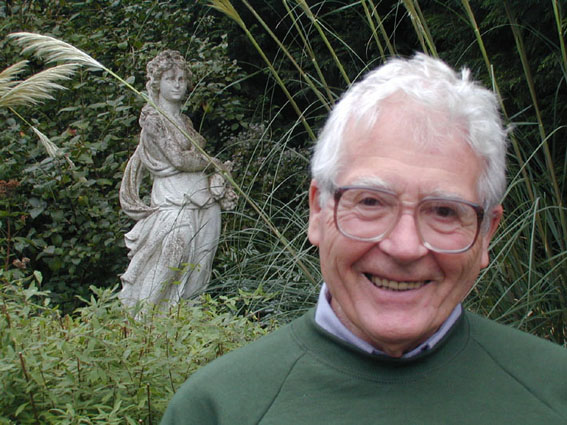
Click on the photo to enlarge it an outstanding scientist pioneer in the development of environmental awareness
|
Short biography
|
|
|
|

Click on the photo to enlarge it an outstanding scientist pioneer in the development of environmental awareness
|
Short biography
James Lovelock : independent scientist, environmentalist, author and researcher, Doctor Honoris Causa of several universities throughout the world, he is considered since several decades as a one of the main ideological leaders, if not the main one, in the history of the development of environmental awareness. James Lovelock is still today one of the main authors in the environmental field. He is the author of " The GaiaTheory ", and " The Ages of Gaia ", which consider the planet Earth as a self-regulated living being, as well as his "Homage to GAIA", an autobiography published in september 2000. More recently, professor Lovelock published his new book, " The Revenge of Gaia ".
James Lovelock is in favor of the use of clean nuclear energy, respectful of the environment : read the introduction of James Lovelock to the book "Environmentalists For Nuclear Energy". He supports the Association of Environmentalists For Nuclear Energy (EFN).
For more information on James Lovelock's fascinating life as an independent scientist & environmentalist, you may click here or read his autobiography "Homage to GAIA".
Click on the cover of the books to enlarge them
176 pages Basic Books, 2006 (July
3) ISBN: 0465 04168X Available at http://www.amazon.com/ The Revenge of
GAIA: Why the Earth Is
Fighting Back - and How We Can still Save
Humanity The book argues that
human society, through greenhouse gas emissions and other
forms of environmental degradation, has brought the natural
world to the brink of a crisis. Temperatures will rise,
Professor Lovelock warns, reliable supplies of water will be
disrupted, life in the oceans will be compromised, food
production will decline, and there will be mass migrations
to areas of the planet's surface which remain
habitable. With fossil fuels
currently the dominant source of energy, he sees a
large-scale switch to nuclear power as vital if electricity
supplies are to continue reliably and carbon dioxide
emissions are to be brought down. July 4 and 5, 2006. The
BBC has convened an expert
panel to examine
issues raised in James Lovelock's latest book, The Revenge
of Gaia. Professor Lovelock
intends The Revenge of Gaia to be a "wake-up call" to
spread awareness that "the Earth is truly in
danger". 305 pages W.W. Norton, New York,
1988 Available at www.amazon.com The Earth, James Lovelock
proposes, behaves as if it were a superorganism, made up
from all the living things and from their material
environment. When he first sketched out his brilliant Gaia
theory in the 1970s, people around the world embraced it,
and within a short time Gaia has moved from the margins of
scientific research to the mainstream. James Lovelock argues
that such things as the level of oxygen, the formation of
clouds, and the saltiness of the oceans may be controlled by
interacting physical, chemical and biological processes. He
believes that "the self-regulation of climate and chemical
composition is a process that emerges from the rightly
coupled evolution of rocks, air and the ocean - in addition
to that of organisms. Such interlocking self-regulation,
while rarely optimal - consider the cold and hot places of
the earth, the wet and the dry - nevertheless keeps the
Earth a place fit for life." The New York Times Book
Review has called his arguments in favor of Gaia
"plausible and above all illuminating." New fields of research
have been opened by this pathbreaking concept. Lovelock adds
: "if we see the world as a superorganism of which we are a
part - not the owner, nor the tenant, not even a passenger -
we could have a long time ahead of us and our species might
survive for its "alloted span". It all depends on you and
me." 185 pages Oxford University Press,
Oxford,1979 Available at www.amazon.com GAIA
- A New Look
at Life on Earth In his classic work that
continues to inspire its many readers, James Lovelock puts
forward his idea that the Earth functions as if it were a
living organism. Written for non-scientists, GAIA is a
journey through time and space, in search of evidence with
which to support a new and radically different model of our
planet. In contrast to the conventional belief that living
matter is passive in the face of threats to its existence,
the book explores the theory that the Earth's living matter
- air, ocean, and land surfaces - forms a complex system
which has the capacity to keep Earth a place fit for
life. Since GAIA was first
published, many of James Lovelock's predictions have come
true and his theory has become a hotly argued topic in
scientific circles. "Lovelock writes
beautifully. A book that is both original and well written
is indeed a bonus. Only a genius thinks of the obvious, and
Lovelock deserves to be described as a genius." New
Scientist. "One of my all time
favorites. The breath-taking sweep of his central idea -
that the Earth is a living, self-regulating organism - poses
the most dramatic challenge to scientists, politicians, and
the environmentalists". Jonathan
Porritt "The exciting and
personal argument of an original thinker caught up in
wonder. It wins and repays attention." Scientific
American. Oxford University Press, Oxford,
2000 Homage to GAIA
- The Life of
an Independent Scientist Lovelock's
autobiography. _______________ "He is to science what
Gandhi was to politics. And his central notion, that the
planet behaves as a living organism, is as radical,
profound, and far-reaching in its impact as any of Gandhi's
ideas." New
scientist. "His Gaia hypothesis' is
certainly heroic, with all the illusion-busting potential of
Galileo's or Einstein's theories." The
Independant.
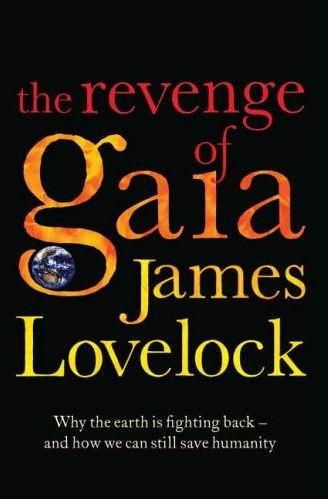
![]()
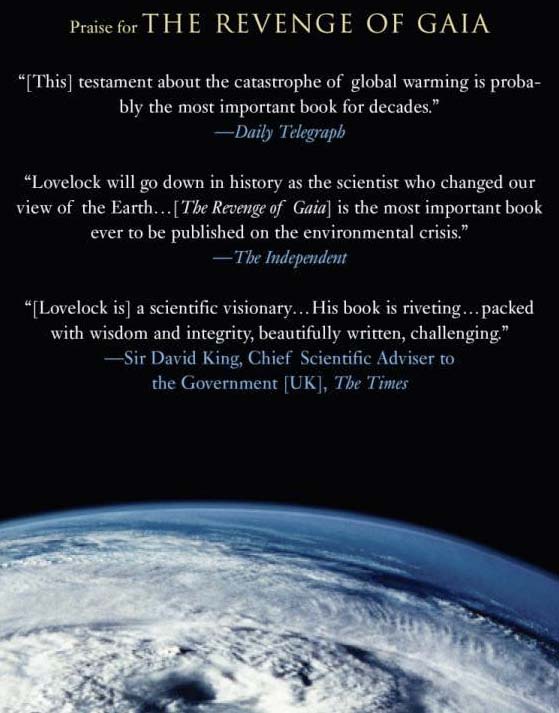
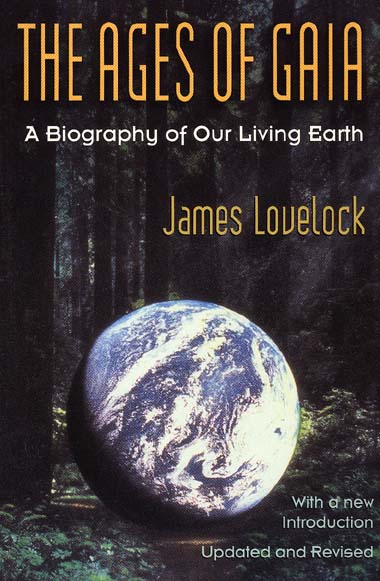

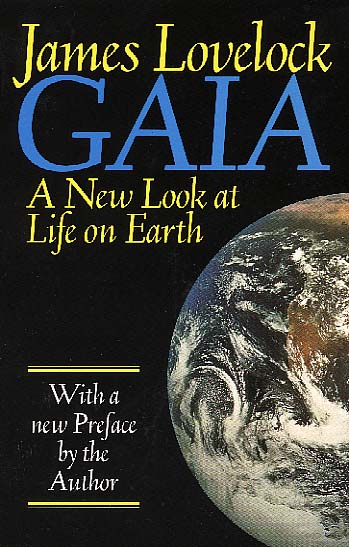
![]()
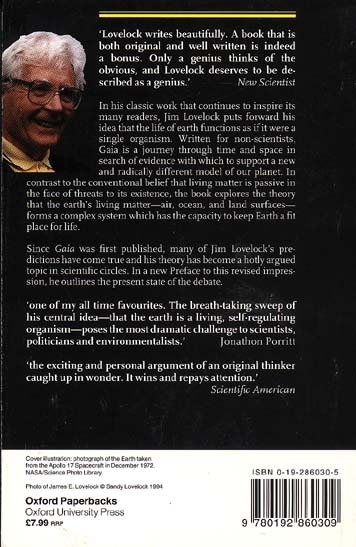
![]()
![]()
Other books by James Lovelock
:
- GAIA: The Practical Guide to Planetary Medicine, Gaia Books, London, 1991.
- The Great Extinction, Doubleday & Co, New York, 1983.
- The Greening of Mars, André Deutsch Ltd, London, 1984.